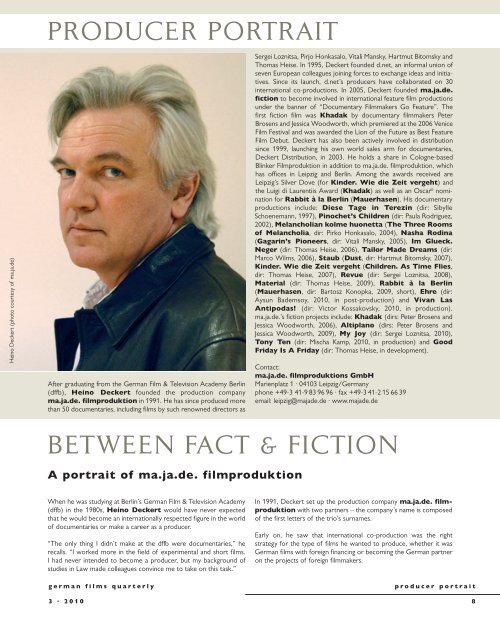German Films
German Films
German Films
You also want an ePaper? Increase the reach of your titles
YUMPU automatically turns print PDFs into web optimized ePapers that Google loves.
Heino Deckert (photo courtesy of ma.ja.de )<br />
PRODUCER PORTRAIT<br />
After graduating from the <strong>German</strong> Film & Television Academy Berlin<br />
(dffb), Heino Deckert founded the production company<br />
ma.ja.de. filmproduktion in 1991. He has since produced more<br />
than 50 documentaries, including films by such renowned directors as<br />
When he was studying at Berlin’s <strong>German</strong> Film & Television Academy<br />
(dffb) in the 1980s, Heino Deckert would have never expected<br />
that he would become an internationally respected figure in the world<br />
of documentaries or make a career as a producer.<br />
“The only thing I didn’t make at the dffb were documentaries,” he<br />
recalls. “I worked more in the field of experimental and short films.<br />
I had never intended to become a producer, but my background of<br />
studies in Law made colleagues convince me to take on this task.”<br />
Sergei Loznitsa, Pirjo Honkasalo, Vitali Mansky, Hartmut Bitomsky and<br />
Thomas Heise. In 1995, Deckert founded d.net, an informal union of<br />
seven European colleagues joining forces to exchange ideas and initiatives.<br />
Since its launch, d.net’s producers have collaborated on 30<br />
international co-productions. In 2005, Deckert founded ma.ja.de.<br />
fiction to become involved in international feature film productions<br />
under the banner of “Documentary Filmmakers Go Feature”. The<br />
first fiction film was Khadak by documentary filmmakers Peter<br />
Brosens and Jessica Woodworth, which premiered at the 2006 Venice<br />
Film Festival and was awarded the Lion of the Future as Best Feature<br />
Film Debut. Deckert has also been actively involved in distribution<br />
since 1999, launching his own world sales arm for documentaries,<br />
Deckert Distribution, in 2003. He holds a share in Cologne-based<br />
Blinker Filmproduktion in addition to ma.ja.de. filmproduktion, which<br />
has offices in Leipzig and Berlin. Among the awards received are<br />
Leipzig’s Silver Dove (for Kinder. Wie die Zeit vergeht) and<br />
the Luigi di Laurentiis Award (Khadak) as well as an Oscar ® nomination<br />
for Rabbit à la Berlin (Mauerhasen). His documentary<br />
productions include: Diese Tage in Terezin (dir: Sibylle<br />
Schoenemann, 1997), Pinochet’s Children (dir: Paula Rodriguez,<br />
2002), Melancholian kolme huonetta (The Three Rooms<br />
of Melancholia, dir: Pirko Honkasalo, 2004), Nasha Rodina<br />
(Gagarin’s Pioneers, dir: Vitali Mansky, 2005), Im Glueck.<br />
Neger (dir: Thomas Heise, 2006), Tailor Made Dreams (dir:<br />
Marco Wilms, 2006), Staub (Dust, dir: Hartmut Bitomsky, 2007),<br />
Kinder. Wie die Zeit vergeht (Children. As Time Flies,<br />
dir: Thomas Heise, 2007), Revue (dir: Sergei Loznitsa, 2008),<br />
Material (dir: Thomas Heise, 2009), Rabbit à la Berlin<br />
(Mauerhasen, dir: Bartosz Konopka, 2009, short), Ehre (dir:<br />
Aysun Bademsoy, 2010, in post-production) and Vivan Las<br />
Antipodas! (dir: Victor Kossakovsky, 2010, in pro duction).<br />
ma.ja.de.’s fiction projects include: Khadak (dirs: Peter Brosens and<br />
Jessica Woodworth, 2006), Altiplano (dirs: Peter Brosens and<br />
Jessica Woodworth, 2009), My Joy (dir: Sergei Loznitsa, 2010),<br />
Tony Ten (dir: Mischa Kamp, 2010, in production) and Good<br />
Friday Is A Friday (dir: Thomas Heise, in development).<br />
Contact:<br />
ma.ja.de. filmproduktions GmbH<br />
Marienplatz 1 · 04103 Leipzig/<strong>German</strong>y<br />
phone +49-3 41-9 83 96 96 · fax +49-3 41-2 15 66 39<br />
email: leipzig@majade.de · www.majade.de<br />
BETWEEN FACT & FICTION<br />
A portrait of ma.ja.de. filmproduktion<br />
In 1991, Deckert set up the production company ma.ja.de. filmproduktion<br />
with two partners – the company’s name is composed<br />
of the first letters of the trio’s surnames.<br />
Early on, he saw that international co-production was the right<br />
strategy for the type of films he wanted to produce, whether it was<br />
<strong>German</strong> films with foreign financing or becoming the <strong>German</strong> partner<br />
on the projects of foreign filmmakers.<br />
german films quarterly producer portrait<br />
3 · 2010 8

















